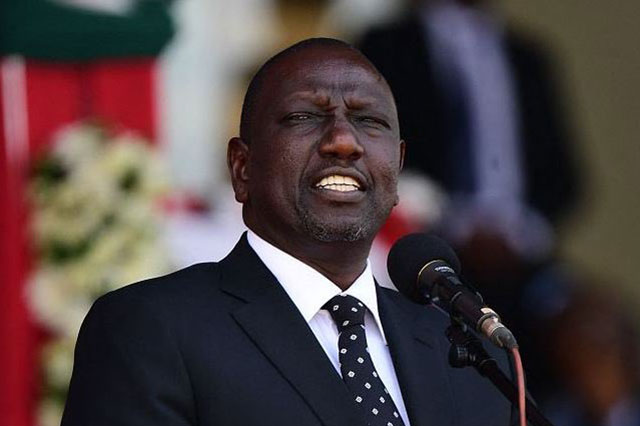Nairobi – Kenyan President William Ruto’s cabinet was sworn in on Thursday, two months after he narrowly won a bitterly-fought but largely peaceful election.
The 22-member line-up will be tasked with tackling the cost of living crisis and other economic issues in the East African country, the cornerstone of Ruto’s election campaign manifesto.
“You will have my support because you have no other option but to succeed. Failure is not an option, we have a country to look after,” Ruto told the new ministers at the event in Nairobi.
Ruto vowed to run an inclusive, transparent and accountable government as he aims to transform the regional powerhouse.
“We have no grey areas, we have nothing to hide. We want to serve the people of Kenya,” he said.
However, the new cabinet did not achieve the gender parity Ruto had promised on the campaign trail, naming just seven women to the team.
Kenya’s new cabinet has been sworn in, confirming ministerial appointments made by the recently elected president, William Ruto. At the ceremony, he promised to run an open, accountable government.https://t.co/abkQmsKrzJ pic.twitter.com/gNSO5GtRR2
— BBC News Africa (@BBCAfrica) October 27, 2022
Musalia Mudavadi, a former vice president who broke ranks with defeated presidential candidate and opposition chief Raila Odinga to back Ruto, assumed the newly-created position of prime cabinet secretary.
The 62-year-old will be the most senior government minister and answer directly to the president and his deputy.
Alfred Mutua, a former governor whose party also sided with Ruto, will take charge of the foreign ministry, while former central bank governor Njuguna Ndung’u is the new treasurer.
Kithure Kindiki, a lawyer who served on the legal team that defended Ruto’s August election win at the Constitutional Court, will head the powerful interior ministry.
The August 9 vote concluded largely peacefully despite the slow transmission of results, a damaging dispute within the election body and the ultimately unsuccessful court challenge by Odinga.
In its final report on the vote, the European Union’s observer mission on Thursday said the election “highlighted many positive elements in Kenya’s continued democratic development and desire to improve the electoral process.”
It nevertheless raised concerns about the running of the vote and pointed to several areas that it said needed urgent reform.
These include election technology, funding for the Independent Electoral and Boundaries Commission and improvements to the tallying process.
Tough going
Ruto’s ministers were unanimously approved by parliament Wednesday despite the committee which vetted the nominees rejecting the appointment of Penina Malonza as tourism minister.
But Malonza sailed through a vote in the 349-member parliament, riding on the majority that Ruto commands.
The immediate focus of the new cabinet will be to lower the cost of living and tackle Kenya’s $70-billion debt mountain.
Ruto, who campaigned as a champion of the poor, has found the going tough on implementing his promises, instead laying the blame on inheriting a dilapidated economy even though he was deputy president in the previous administration.
This week he asked for a year to lower the price of maize flour used to prepare ugali, a dense porridge that is Kenya’s staple food, renouncing a pledge to do so immediately he took office.
ALSO READ | Kenya to exhume body of British woman linked to cult
Among his first acts after assuming power was to slash food and fuel subsidies introduced by former president Uhuru Kenyatta.
The rags-to-riches businessman last month said he would overhaul Kenya’s income tax regime and introduce reforms that would press high earners to pay more to help reduce inequality.
Kenya is the most dynamic economy in East Africa but many of its people are suffering financial hardship, with about a third of the population living in poverty.
Prices for basic goods rocketed following the Covid pandemic and in response to the war in Ukraine, and unemployment remains a major problem, particularly among the young.
Inflation soared to a five-year high of 9.2 percent in September, while the currency is at record lows at around 122 shillings to the US dollar.
Follow African Insider on Facebook, Twitter and Instagram
Source: AFP
Picture: Twitter/@KhadarGulaid
For more African news, visit Africaninsider.com


